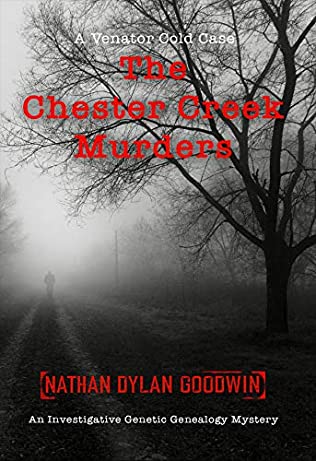I have been involved in genealogical research for about 25 years. For the last half dozen years, I have been using DNA testing to find relatives. I also enjoy reading detective novels.
When I set out to write this review of The Chester Creek Murders, by Nathan Dylan Goodwin, I discovered that there is a Facebook Group called the Genealogical Crime Mystery Book Club. Goodwin is one of the founding members. More about that later.
I had read several of Goodwin’s previous books featuring Morton Farrier, a British genealogical researcher in The Forensic Genealogist Series.
Now he has kicked off a new series called the Venator Cold Case series, with The Chester Creek Murders as book No. 1. Here is the official blurb that introduces this just-published book:
“When Detective Clayton Tyler is tasked with reviewing the formidable archives of unsolved homicides in his police department’s vaults, he settles on one particular cold case from the 1980s: The Chester Creek Murders. Three young women were brutally murdered—their bodies dumped in Chester Creek, Delaware County—by a serial killer who has confounded a slew of detectives and evaded capture for over thirty-eight years.

“With no new leads or information at his disposal, the detective contacts Venator for help, a company that uses cutting-edge investigative genetic genealogy to profile perpetrators solely from DNA evidence.
“Taking on the case, Madison Scott-Barnhart and her small team at Venator must use their forensic genealogical expertise to attempt finally to bring the serial killer to justice. Madison, meanwhile, has to weigh professional and personal issues carefully, including the looming five-year anniversary of her husband’s disappearance.”
Venator operates out of an office just down the street from the Family History Library in Salt Lake City, Utah. As you might imagine, Maddy and her staff pay visits to the Library in the course of working on their cold case projects.
Detective Tyler brings to them a DNA profile collected from the three cold cases. There is no match in CODIS (Combined DNA Index System), so the Venator team has to match the DNA results to DNA profiles available on AncestryDNA, 23andMe, and Gedmatch to find possible matches. Then they build family trees from the matches to find common ancestors and add descendants from these common ancestors.
The book offers insights into forensic/genetic genealogy practices. The Venator staff use FamilySearch.org to conduct searches and refer to the FamilySearch Wiki to learn what records are available for different localities around the country. They check several sources to build profiles of the people in the family trees they are building, such as social media, BeenVerified.com, Classmates.com, Newspapers.com, and even microfilm at the FHL.
Finally, they determine who was in the locations in southeastern Pennsylvania at the time of the murders. All this work pays off when they identify a likely perpetrator and Detective Tyler is able to find conclusive evidence during a home search and make the arrest.
I read The Chester Creek Murders over a two-day period. And I am looking forward to Goodwin’s next book in this series. He suggests some questions involving the staff at Venator that could be answered in the next book and hints at cases to come.
In addition to Goodwin, the FB Group features authors MJ Lee, Stephen Molyneux, and Wendy Percival. The group aims to promote the growing genre of genealogical crime mystery books and to encourage general discussion around the books, stories, and their authors. It is free to join if you are interested.

Leave a Reply